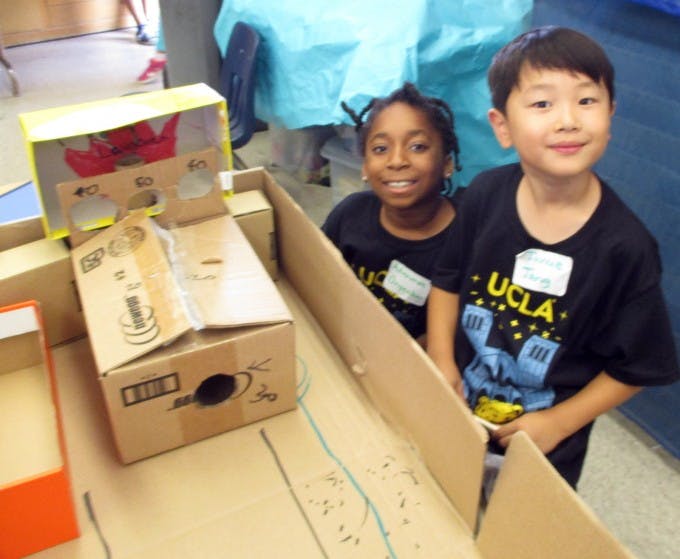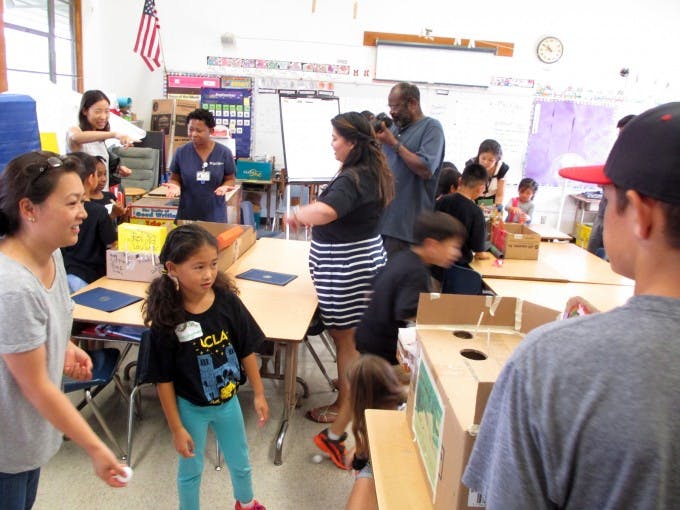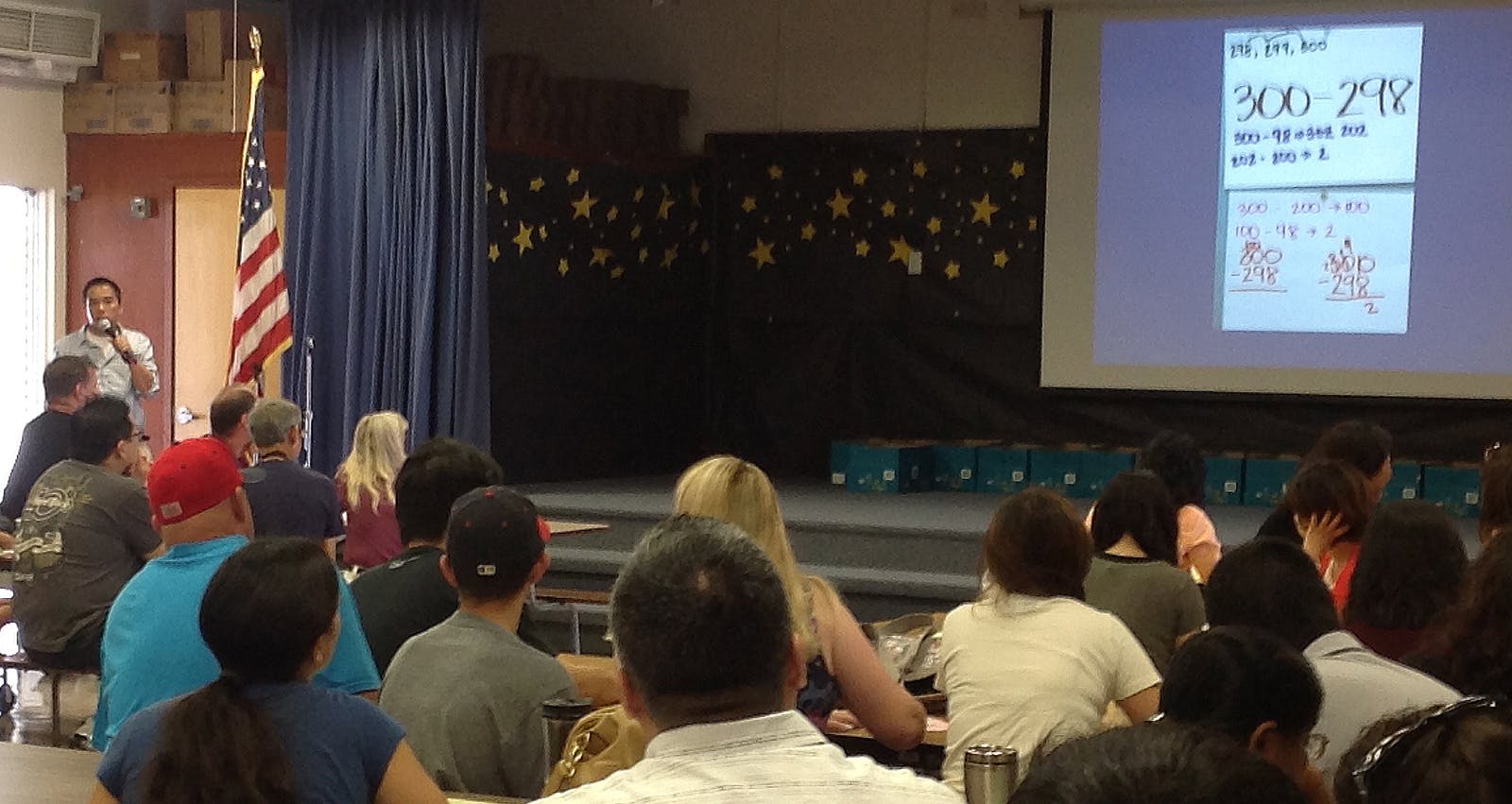The cafeteria at John Adams Elementary School in Torrance was packed, an unusual occurrence for a Friday in late July. But instead of students eating their lunch, the benches seated parents whose children had taken part in a UCLA Young Scholars STEM workshop the previous week. Theodore Sagun, a math coach for the Math Project at UCLA’s Center X, facilitated a workshop on “Supporting Your Children in Common Core State Standards Mathematics.” He quizzed the parents and encouraged them to recall their own approaches to math in elementary school, and shared ways for them to propel their students to success with homework and in the classroom.
“Parents are instrumental in their child’s learning of math,” says Sagun, who serves on the board of directors of the Greater Los Angeles Mathematics Council. “We want them to be involved and to encourage their kids to develop critical thinking, problem solving skills, and communication skills. Homework presents parents with a fantastic opportunity to ask how the child may have arrived at a solution, how the child may have reasoned through a problem, and if there are other possible strategies to solve a problem.”
Sagun led the assembled parents in a number sense activity, where the answer to a mathematical problem would not be immediately found by rote memory. The parents, who answered the multidigit addition and multiplication problems that Sagun posed during the workshop, broke into sheepish laughter when explaining how they arrived at the correct answers by using traditional techniques such as carrying numerals.
“I wanted parents to implicitly understand that deriving strategies for some of their calculations requires the use of fundamental properties of addition and multiplication,” says Sagun. “Furthermore, I wanted them to see there was more than one way of arriving at an answer.”
After teaching middle and high school mathematics for more than a decade, Sagun says that parents should be curious and ask questions about the ways that students are learning math today, particularly with the emphasis on technology.
“Technology is ubiquitous today,” he says. “It is an excellent tool, especially for solving math problems and developing number sense. I suggest that parents are involved in their child’s usage of technology, namely iPads, computer games, and smart phone apps because they provide ample resources that students can use to learn math deeply.”

The UCLA Parent Project conducts workshops throughout the school year and during the summer, working with schools throughout LAUSD, the Lennox Elementary School District, Manhattan Beach Unified School District, Baldwin Park Unified School District, and University High School in Los Angeles. Carolee Koehn Hurtado, director of the UCLA Parent Project, says that the program often works in tandem with professional development for teachers in academic areas from math and English language arts to preparing students for college.
“We work with schools, parents, and administrators to think about what parents would be interested in, and then design learning opportunities for them,” she says. “We provide opportunities for parents to understand the professional development and instructional efforts at a school site, and have simultaneous parent workshops so that they can understand the new vision of the district, where instruction is headed, and how to support kids.”
Koehn Hurtado says that the UCLA Parent Project works to enable collaboration between parents and schools in order to bring about their students’ success.
“We come from the perspective that parents are great contributors to their child’s education and can be partners with schools,” she says. “There are a lot of expectations of teachers today. The UCLA Parent Project supports them by giving parents opportunities to learn about what teachers are doing, so it’s not only up to them individually to let parents know what’s happening.”
Koehn Hurtado, who also serves as director of the UCLA Mathematics Project, says that school need to inform and support parents in understanding the current climate of changing standards and asking students to engage in math, science, and English in ways that are unfamiliar to their parents. She notes that these efforts have “really started to change the dynamics between parents and schools.”
“Parents are better able to help their children at home, and ideally, schools are learning from parents,” Koehn Hurtado says. “At first, kids say to parents, ‘You can’t really help me with my homework because that’s not how my teacher does it.’ It has brought us to the point where students realize there’s a lot their parents can do.”
“Parents are instrumental during homework time,” says Sagun, “because it presents an opportunity to be encouraging and to support [children’s] development of perseverance and persistence. Parents should develop relationships with their child’s teachers to simply inquire about and monitor their child’s learning and to gather more resources to help them support their kids at home.”

Ada Hasegawa says that her daughter expressed an interest in science after attending a STEM activity during the school year at John Adams Elementary School. This led her to enroll Ashley, who will enter the 2 grade this fall, in the UCLA Young Scholars workshop.
“Ashley has shown some interest [in STEM], like wanting to make medicine when she grows up,” says Ada Hasegawa. “And she loves to participate in chemical reaction type of activities. Cause and effect visual stimulation is what really excites her. So, when this opportunity came up and it was facilitated at her home school it was a no-brainer that she would attend.”
Hasegawa, who is a system administrator at Northrop Grumman, and whose husband is a Powertrain Engineer at SRD Engineering, says that it is important that parents emphasize the relevance of math and science in everyday life. She is impressed that schools focus on STEM more than when she was an elementary student., says that it is important that parents emphasize the relevance of math and science in everyday life. She is impressed that schools focus on STEM more than when she was an elementary student.
“Overall, this is a good thing to get kids exposed to STEM at an early age,” she says. “I don’t remember learning about chemical reaction in the 1 grade, or making an arcade game at age seven. I believe programs like UCLA Young Scholars will make an impact on my daughter’s future. This workshop gave her the opportunity to be exposed to what STEM is really about and how it is used in our daily lives. If my daughter can tap into the resources that UCLA Young Scholars program provides, it’s one step closer to her in succeeding in her academic future plans.”
Part of the UCLA Parent Project’s aim is to learn about parental concerns regarding their child’s experience in school. Hasegawa is concerned that educators do not always recognize individual styles of learning.
“Not all teachers teach the same way; some make it fun and easy to relate, while some are stricter than others,” she says. “Not all kids learn at the same pace or grasp information at the same wavelength. There are a lot of factors that play into this.”
Hasegawa says that ultimately, parents need to learn to adapt to the changes in education in order to better assist their children with homework and in school.
“Most of us are stuck in a traditional way of learning,” she notes. “Old habits are hard to break, even with all the information and resources given. As adults, we have to learn to adapt at the same time as our kids so we can better assist them.”
Above: Theodore Sagun, a math coach for the Math Project at UCLA’s Center X, led a workshop at John Adams Elementary School to teach parents new ways to approach math homework.
